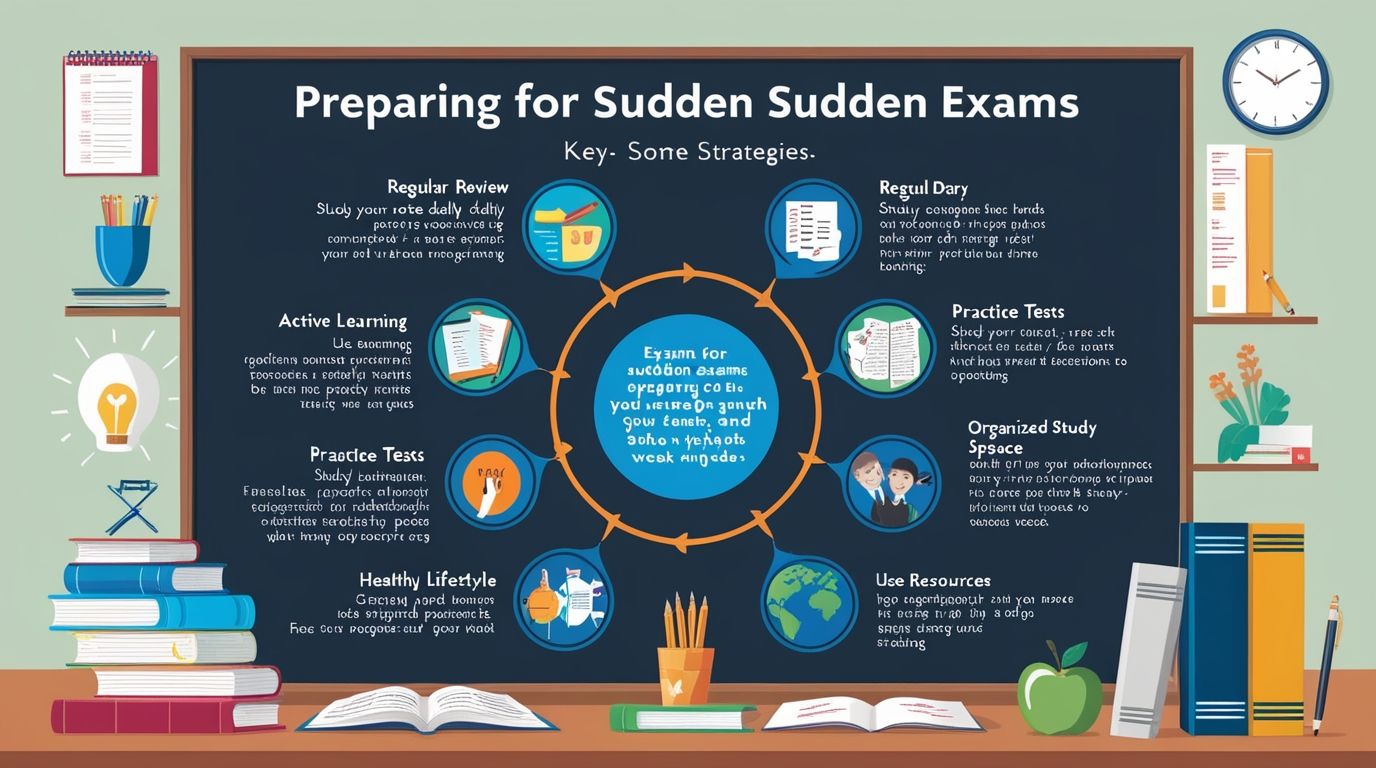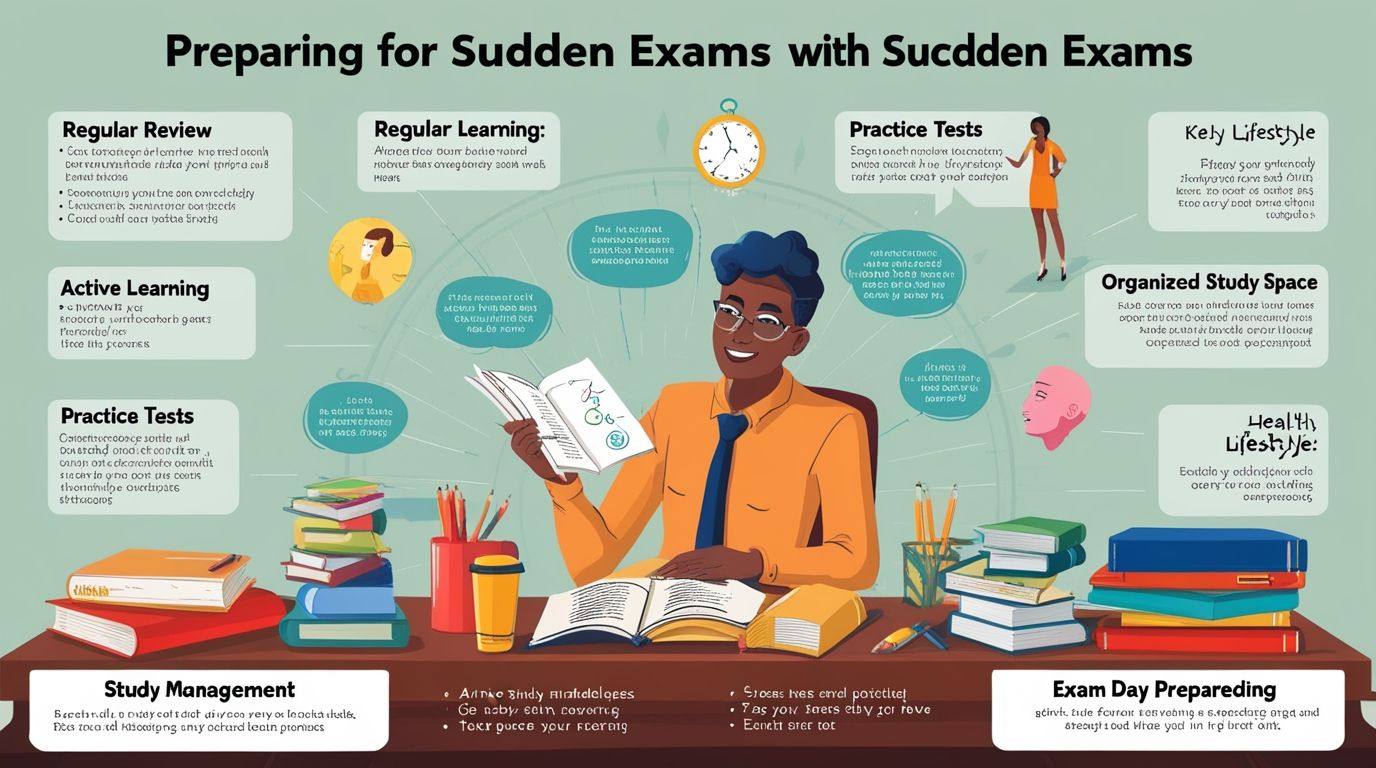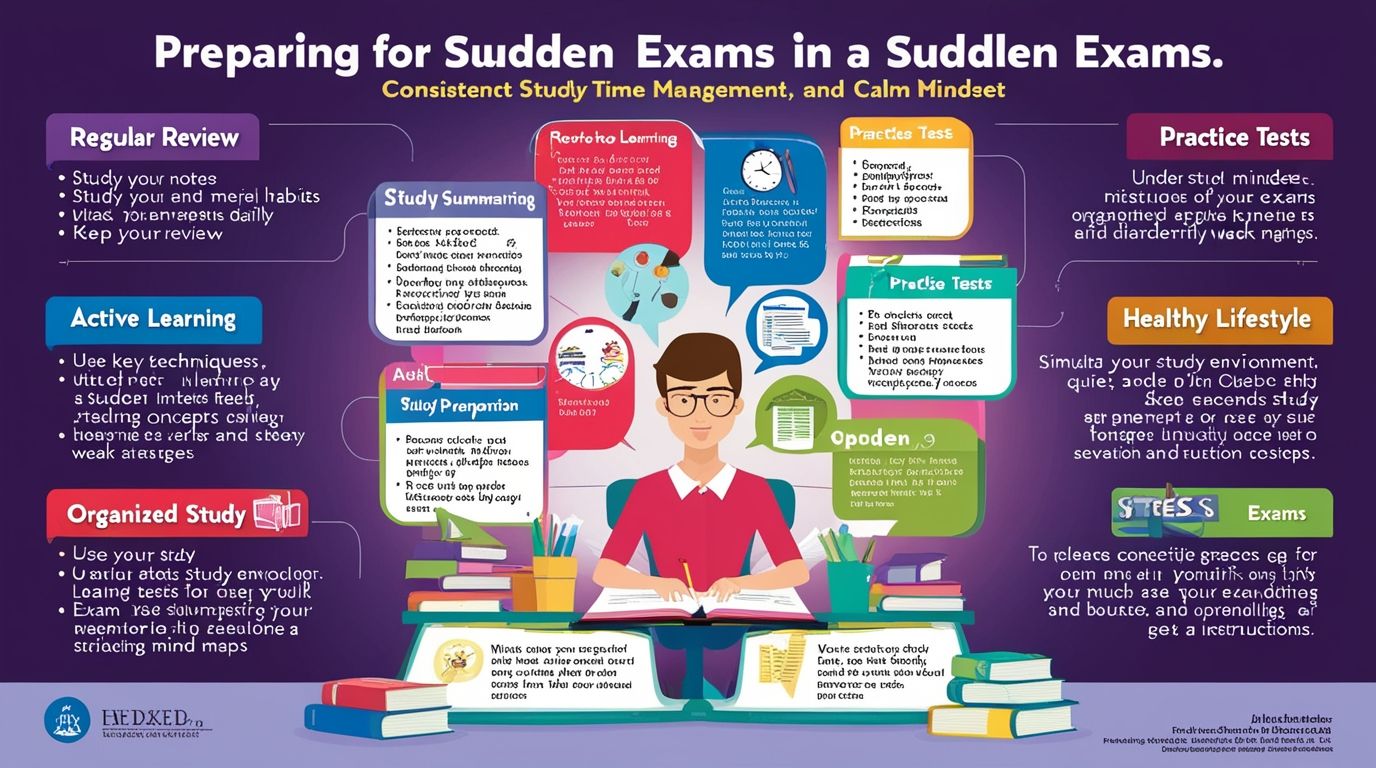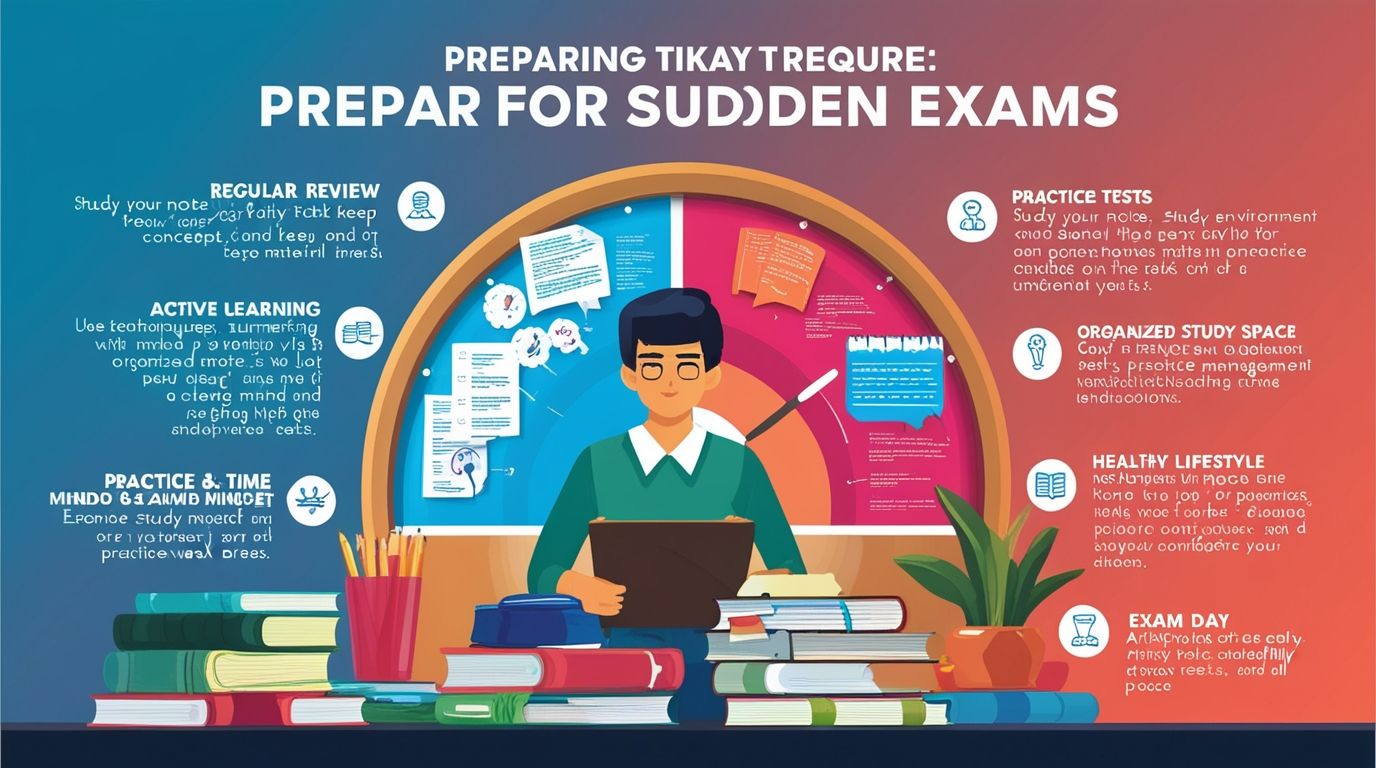Introduction
Sudden exams are a common challenge faced by students across all levels of education. Whether it’s a pop quiz, a surprise test, or an unannounced assessment, the key to success lies in effective preparation and a calm, focused approach. This article will explore strategies and techniques to help students prepare for sudden exams, ensuring they can perform their best even in unexpected situations.
Understanding the Importance of Preparedness
Being prepared for sudden exams is crucial for several reasons:
- Academic Performance: Regularly studying and staying on top of the material can significantly improve your academic performance, even when exams are unannounced.
- Stress Reduction: Preparedness reduces anxiety and stress, allowing you to approach exams with confidence.
- Knowledge Retention: Regular review and study help in retaining information better, making it easier to recall during exams.

Developing a Study Routine
One of the most effective ways to prepare for sudden exams is to establish a consistent study routine. Here are some tips:
- Daily Review: Spend at least 30 minutes each day reviewing notes and materials from your classes. This helps reinforce learning and keeps the information fresh in your mind.
- Active Learning: Engage in active learning techniques such as summarizing information, teaching concepts to a peer, or creating mind maps. These methods enhance understanding and retention.
- Time Management: Allocate specific time slots for studying each subject. This ensures a balanced approach and prevents last-minute cramming.
Utilizing Effective Study Techniques
Different study techniques can enhance your preparation for sudden exams. Here are some effective methods:
- Spaced Repetition: This technique involves reviewing information at increasing intervals. It helps improve long-term retention and recall.
- Practice Tests: Take practice tests or quizzes to simulate exam conditions. This can help you identify weak areas and improve your test-taking skills.
- Flashcards: Use flashcards for key concepts, terms, and definitions. They are portable and allow for quick review sessions.
Creating a Conducive Study Environment
A conducive study environment can significantly impact your ability to concentrate and retain information. Here are some tips:
- Eliminate Distractions: Find a quiet place to study and eliminate distractions such as mobile phones, social media, and noisy environments.
- Organized Space: Keep your study area organized with all necessary materials within reach. This minimizes interruptions and keeps you focused.
- Comfortable Setting: Ensure your study space is comfortable, with proper lighting and seating arrangements.

Maintaining a Healthy Lifestyle
A healthy lifestyle plays a crucial role in effective exam preparation. Here are some aspects to consider:
- Balanced Diet: Eat a balanced diet rich in fruits, vegetables, and proteins. Avoid excessive caffeine and sugar, as they can cause energy crashes.
- Regular Exercise: Engage in regular physical activity to boost energy levels and reduce stress. Even short walks can help clear your mind and improve focus.
- Adequate Sleep: Ensure you get enough sleep each night. Lack of sleep can impair cognitive functions and negatively impact exam performance.
Managing Stress and Anxiety
Stress and anxiety are common when facing sudden exams. Here are some strategies to manage them:
- Mindfulness and Meditation: Practice mindfulness and meditation techniques to calm your mind and reduce anxiety. Even a few minutes each day can make a significant difference.
- Positive Self-talk: Use positive affirmations and self-talk to build confidence and reduce negative thoughts.
- Relaxation Techniques: Engage in relaxation techniques such as deep breathing, progressive muscle relaxation, or listening to calming music.
Utilizing Available Resources
Make the most of available resources to aid your exam preparation:
- Class Notes: Regularly review your class notes and highlight key points. This helps in quick revision before the exam.
- Textbooks and Study Guides: Refer to textbooks and study guides for detailed explanations and additional practice problems.
- Online Resources: Utilize online resources such as educational websites, videos, and forums to supplement your learning.
Group Study and Peer Support
Group study sessions and peer support can enhance your preparation for sudden exams. Here’s how:
- Collaborative Learning: Study with peers to discuss concepts, solve problems, and share insights. This promotes a deeper understanding of the material.
- Accountability Partners: Partner with a peer to keep each other accountable for studying and staying on track with your goals.
- Study Groups: Join or form study groups where members can share resources, quiz each other, and provide mutual support.

Exam Day Strategies
On the day of the exam, it’s essential to remain calm and focused. Here are some tips:
- Arrive Early: Arrive at the exam location early to settle in and reduce last-minute stress.
- Stay Positive: Maintain a positive attitude and remind yourself of your preparation efforts.
- Read Instructions Carefully: Carefully read all instructions and questions before starting. This ensures you understand the requirements and avoid mistakes.
Post-Exam Reflection
After the exam, take some time to reflect on your performance:
- Review Your Answers: If possible, review your answers to understand any mistakes and learn from them.
- Seek Feedback: Seek feedback from your teacher or peers to identify areas for improvement.
- Plan Ahead: Use the experience to plan your study strategies for future exams and continuously improve.
Conclusion
Preparing for sudden exams requires a proactive and consistent approach. By developing a study routine, utilizing effective techniques, maintaining a healthy lifestyle, and managing stress, you can enhance your readiness and perform well even under unexpected circumstances. Remember, the key is to stay calm, stay focused, and believe in your abilities. With the right preparation and mindset, you can tackle any sudden exam with confidence and success.

9obbk5
71mz0y
Utterly indited subject material, Really enjoyed reading through.
купить аккаунт площадка для продажи аккаунтов
продажа аккаунтов соцсетей гарантия при продаже аккаунтов
маркетплейс аккаунтов продажа аккаунтов соцсетей
перепродажа аккаунтов маркетплейс аккаунтов соцсетей
маркетплейс аккаунтов соцсетей продажа аккаунтов соцсетей
перепродажа аккаунтов купить аккаунт с прокачкой
продать аккаунт купить аккаунт
Sell Pre-made Account Account Trading Platform
Account Buying Platform Account Buying Platform
Website for Buying Accounts Account Store
Social media account marketplace Marketplace for Ready-Made Accounts
Find Accounts for Sale Account Selling Platform
Sell Pre-made Account Buy Pre-made Account
Account Buying Service Buy and Sell Accounts
Sell Account Verified Accounts for Sale
Account Acquisition Buy Account
Account Sale Account marketplace
account store account store
buy accounts buy and sell accounts
ready-made accounts for sale website for selling accounts
sell pre-made account account trading service
verified accounts for sale account market
account exchange service account exchange
account marketplace account market
account marketplace https://accountsmarketdiscount.com/
purchase ready-made accounts account market
account marketplace https://socialaccountsshop.com
account trading account market
buy accounts sell account
account market website for selling accounts
website for selling accounts account catalog
verified accounts for sale account trading
gaming account marketplace buy account
database of accounts for sale verified accounts for sale
purchase ready-made accounts account market
profitable account sales account marketplace
account marketplace profitable account sales
marketplace for ready-made accounts account exchange service
sell pre-made account account exchange
account acquisition online account store
account market account marketplace
sell accounts sell accounts
account trading service accounts marketplace
accounts for sale account trading platform
account trading service buy accounts
account buying platform https://accounts-marketplace.xyz/
account selling service https://buy-best-accounts.org
account trading platform buy accounts
accounts market https://accounts-marketplace.live
account trading social-accounts-marketplace.xyz
secure account purchasing platform buy-accounts.space
account acquisition https://buy-accounts-shop.pro
account trading https://buy-accounts.live
find accounts for sale buy accounts
guaranteed accounts buy accounts
accounts market https://accounts-marketplace-best.pro
магазин аккаунтов akkaunty-na-prodazhu.pro
покупка аккаунтов https://rynok-akkauntov.top
купить аккаунт маркетплейсов аккаунтов
маркетплейс аккаунтов соцсетей https://akkaunt-magazin.online/
продать аккаунт https://akkaunty-market.live/
покупка аккаунтов https://kupit-akkaunty-market.xyz/
магазин аккаунтов akkaunty-optom.live
маркетплейс аккаунтов https://online-akkaunty-magazin.xyz
маркетплейс аккаунтов соцсетей https://akkaunty-dlya-prodazhi.pro
биржа аккаунтов https://kupit-akkaunt.online/
buy facebook ad account buy fb account
facebook ads account for sale https://buy-ad-accounts.click
buy fb ad account https://buy-ad-account.top/
cheap facebook accounts https://buy-ads-account.click
buy fb account https://ad-account-buy.top/
buy facebook account https://buy-ads-account.work
fb account for sale https://ad-account-for-sale.top
cheap facebook advertising account facebook account buy
cheap facebook accounts ad-accounts-for-sale.work
google ads reseller https://buy-ads-account.top
buy google ad threshold account google ads accounts
buy facebook account buy old facebook account for ads
buy google ad account google ads account seller
buy google adwords accounts https://ads-account-buy.work
buy account google ads buy google adwords account
adwords account for sale buy google ad account
google ads agency accounts https://buy-ads-agency-account.top
buy old google ads account https://sell-ads-account.click
buy google ads https://ads-agency-account-buy.click/
buy facebook verified business account https://buy-business-manager.org/
old google ads account for sale https://buy-verified-ads-account.work
facebook bm account buy https://buy-bm-account.org/
verified business manager for sale facebook bm for sale
unlimited bm facebook https://buy-verified-business-manager.org
buy verified facebook buy-business-manager-acc.org
facebook bm for sale https://business-manager-for-sale.org/
facebook bm account buy buy-business-manager-verified.org
business manager for sale buy verified facebook business manager
facebook bm buy https://verified-business-manager-for-sale.org/
buy verified bm facebook https://buy-business-manager-accounts.org
buy tiktok ad account https://buy-tiktok-ads-account.org
buy tiktok ads https://tiktok-ads-account-buy.org
buy tiktok ad account https://tiktok-ads-account-for-sale.org
tiktok ads account buy https://tiktok-agency-account-for-sale.org
tiktok ad accounts tiktok ads account buy
tiktok ad accounts https://buy-tiktok-ads-accounts.org
buy tiktok business account https://tiktok-ads-agency-account.org
tiktok ad accounts tiktok ads account for sale
tiktok agency account for sale https://buy-tiktok-ads.org
I truly enjoy reading on this website , it has fantastic blog posts.
buy fb account website for buying accounts account purchase
buy facebook account buy accounts accounts for sale
hello!,I love your writing so much! proportion we keep in touch extra about your article on AOL? I require a specialist in this area to unravel my problem. May be that’s you! Having a look forward to look you.
Hi there! This is kind of off topic but I need some guidance from an established blog. Is it tough to set up your own blog? I’m not very techincal but I can figure things out pretty fast. I’m thinking about creating my own but I’m not sure where to start. Do you have any points or suggestions? Cheers
You have mentioned very interesting points! ps decent web site.